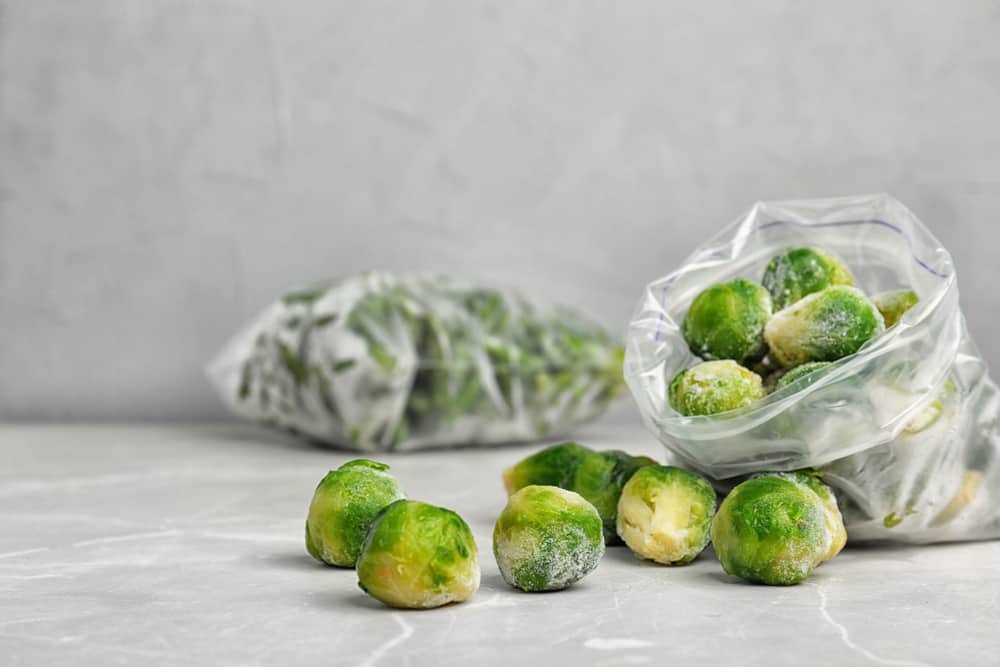You’ve just come home from the office, and you’re excited to make some Brussels sprouts for dinner. You start to prepare everything, but then you realize you forgot to thaw them out! What do you do?
Brussel sprouts are an incredibly healthy and delicious vegetable that can accompany many different dishes. However, frozen brussel sprouts can often be difficult to prepare correctly. Luckily, there are a few different ways to thaw frozen Brussels sprouts.
If you’re looking for a guide on how to thaw frozen brussel sprouts, this article is the perfect place to start! We’ll provide a step-by-step overview of the best methods for thawing your frozen brussel sprouts.
Why Freeze Brussel Sprouts?
Brussels sprouts are a type of cruciferous vegetable that closely resemble miniature cabbages. They are members of the Brassica family, which includes other vegetables such as broccoli, cauliflower, and kale.
Freezing Brussels sprouts is a great way to preserve their freshness and nutritional value for longer periods. Here are some reasons why you might want to freeze Brussels sprouts:
- To extend their shelf life: Freezing Brussels sprouts allows you to keep them fresh for up to 8-12 months, whereas fresh Brussels sprouts may only last a few days to a couple of weeks in the refrigerator.
- To save time: By freezing Brussels sprouts, you can prepare them in advance and have them on hand for quick and easy meals.
- To reduce food waste: Freezing Brussels sprouts is a great way to avoid throwing away excess or unused vegetables.
- To preserve their nutritional value: Freezing Brussels sprouts helps retain their nutrients, such as vitamins C and K, which can be lost over time if stored in the refrigerator.
When freezing Brussels sprouts, it’s important to blanch them first to stop enzyme activity and prevent them from becoming tough or bitter during storage.
This involves boiling the Brussels sprouts for a few minutes and then plunging them into ice water to cool them down before freezing.
How Long Does It Take To Thaw Frozen Brussels Sprouts?
The time it takes to defrost frozen Brussels sprouts will vary depending on your chosen method. However, it will generally take around 30 minutes for them to thaw using the defrost setting on your microwave. If you use the stovetop or refrigerator methods, it will take significantly longer – about 3-4 hours for the stovetop and 12-24 hours for the refrigerator.
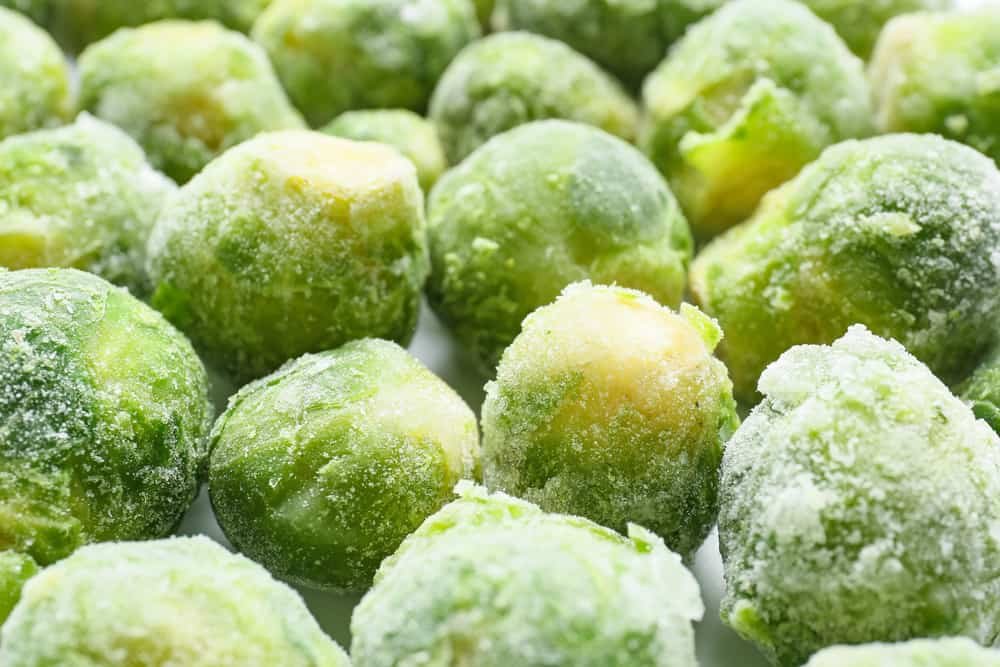
How to Thaw Frozen Brussels Sprouts?
There are several methods you can use to thaw Brussels Sprouts quickly and safely. The best way to defrost frozen Brussels sprouts is in the refrigerator overnight. Simply place them in a covered dish or container and let them thaw slowly in the fridge.
Alternatively, the next best way is to leave them on the kitchen counter at room temperature. This ensures the quality and texture are not compromised. When you cook Brussels sprouts defrosted naturally, the taste is always incredible.
For a quicker method, you can place the frozen sprouts in a colander or strainer for a few minutes. If you’re really in a hurry, you can microwave frozen Brussels sprouts on the defrost setting for 1-2 minutes, but be sure to cook them immediately after microwaving.
Alternatively, you can either submerge the frozen brussels sprouts in a bowl of cold water or run cold water over them in the sink.
How can you Thaw Frozen Brussels Sprouts in a Microwave?
If you’re in a hurry to cook or roast some frozen brussels sprouts, the microwave is the way to go. Here’s how to thaw them quickly and efficiently:
- Remove them from the bag
- Place the frozen brussels sprouts in a microwave-safe dish.
- Add 1/4 cup of water to the dish.
- Cover the dish with a damp paper towel.
- Microwave on the defrost setting for 2-3 minutes, stirring halfway through.
- Once thawed, drain any excess water and proceed with cooking as desired.
How can you Thaw Frozen Brussels Sprouts in the Oven?
There are a few steps you need to take in order to thaw frozen sprouts in the oven. Here’s what you need to do:
- Preheat your oven to 350 degrees Fahrenheit.
- Remove the frozen brussels sprouts from the packaging.
- Spread them out on a baking sheet lined with foil or parchment paper.
- Bake for 10-12 minutes, or until thawed.
At this stage, you are not looking for hot Brussels sprouts, just thawed-out specimens. Therefore, do not leave them in the oven for very long, and be sure to use an oven-safe sheet pan when doing so.
Can you Thaw Frozen Brussels Sprouts in an Air Fryer?
You can thaw frozen sprouts in an air fryer. First, remove the frozen brussels sprouts from their packaging and place them in the air fryer basket. Set the air fryer to 400 degrees Fahrenheit and cook for 5-7 minutes.
Once the time is up, remove the basket and shake it so that the brussels sprouts are evenly cooked. Return the basket to the air fryer and cook for additional time if it’s required.
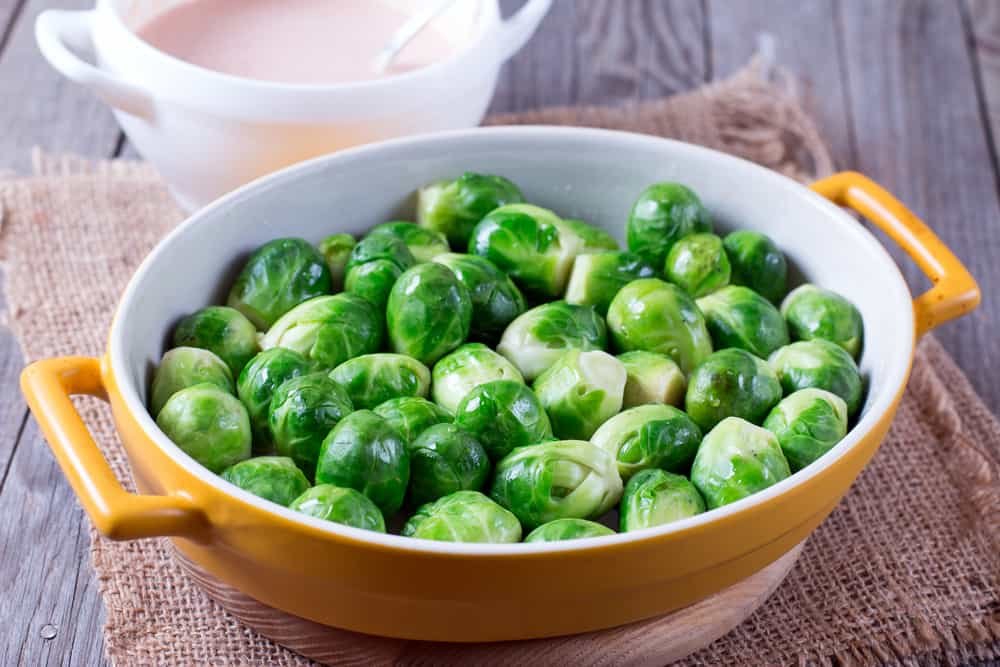
Can you Thaw Frozen Brussels Sprouts in an Air Fryer?
Yes, you can thaw frozen Brussels sprouts in an air fryer. However, it’s important to note that you should not cook frozen Brussels sprouts in an air fryer without thawing them first, as this can result in uneven cooking and a less-than-desirable texture.
To thaw frozen Brussels sprouts in an air fryer, follow these steps:
- Preheat your air fryer to 350°F.
- Remove the frozen Brussels sprouts from the freezer and place them in a single layer in the air fryer basket.
- Cook the Brussels sprouts for 5-7 minutes, shaking the basket occasionally to ensure even cooking.
- Check the Brussels sprouts for doneness. If frozen in the center, continue cooking for another 1-2 minutes.
- Once the Brussels sprouts are thawed and heated through, you can increase the temperature of the air fryer to your desired level and continue cooking until they are crispy and browned.
Remember that the exact cooking time may vary depending on the size and quantity of your frozen Brussels sprouts, as well as the wattage of your air fryer. It’s always a good idea to check your food frequently to avoid overcooking or burning.
Can you Defrost Frozen Brussels Sprouts at Room Temperature?
It is not recommended to defrost frozen Brussels sprouts at room temperature, as this can lead to bacterial growth and foodborne illness.
When food is left at room temperature for an extended period, harmful bacteria can multiply and cause food to spoil, making you sick if consumed.
The safest way to defrost frozen Brussels sprouts is to do so in the refrigerator or using the cold water method. Here’s how:
- Refrigerator Method: Place the frozen Brussels sprouts in a bowl or on a plate and place them in the refrigerator to thaw overnight. This method is the safest and slowest, as it can take several hours to thaw.
- Cold Water Method: Place the frozen Brussels sprouts in a leak-proof plastic bag and submerge the bag in a bowl of cold water. Change the water every 30 minutes until the Brussels sprouts are thawed. This method is faster than refrigerators but requires more attention and effort.
It’s important to note that once the frozen Brussels sprouts have thawed, they should be used within 1-2 days and not refrozen.
Can You Thaw Frozen Brussels Sprouts in Cold Water?
If you need to quickly thaw frozen sprouts, cold water is one of the best alternatives. You can put the frozen brussels sprouts in a bowl of cold water or run cold water over them in the sink. Make sure your veggies are completely submerged in the water. You don’t have to worry about food safety if you let frozen brussels sprouts thaw in cold water as long as you cook them all the way through afterward.
Why should you not use Warm Water to thaw frozen Brussel Sprouts?
When it comes to thawing frozen Brussels sprouts, warm water is not the way to go. Warm water can cause the Brussels sprouts to start cooking, which means they’ll be mushy and not as crisp when you finally cook them. The warmer water also causes the Brussels sprouts to lose some of their nutrients.
If you use warm water to thaw your Brussels sprouts, be sure to cook them right away. Otherwise, they could make you sick. This bacteria cannot be cooked out of the food. The result is you and your entire household will get food poisoning. Always use cold water to thaw out any frozen food.
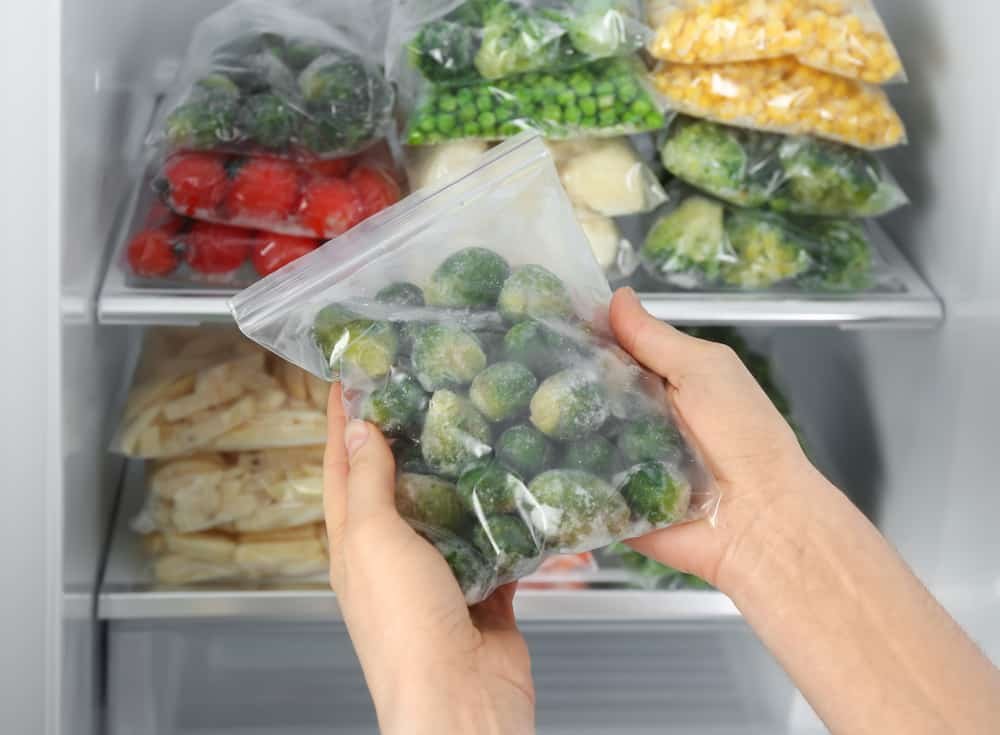
Should you always Thaw Frozen Brussels Sprouts before Cooking them?
Brussels sprouts are a nutrient-rich vegetable that is low in calories and saturated fat. Most people believe that it is necessary to defrost frozen Brussels sprouts before cooking them, but this is not always the case. You can cook frozen Brussels sprouts without first thawing them, but you may need to adjust the cooking time depending on the method you use.
If you are roasting or pan-frying frozen sprouts, you can cook them without thawing them first. Just make sure they are spread out in a single layer on your baking sheet or in the pan so they cook evenly in order to make some crispy roasted brussel sprouts. If you are boiling or microwaving frozen Brussels sprouts, they will cook more evenly if they are first thawed.
It’s also said that when Frozen Brussels sprouts are cooked directly from frozen, they’ll even retain more of their nutrients such as vitamin c. But if you’re looking for the best flavor and texture, then you should thaw your Brussels sprouts before cooking them. Thawed Brussels sprouts will be more tender and have a better flavor than those that are cooked frozen.
How do you get Frozen Brussels Sprouts Crispy?
One of the most popular ways of doing this is to put them in the air fryer. In approximately 20 minutes, your Brussels sprouts will be tender on the inside, yet delightfully crispy on the outside.
If you do not have an air fryer, roasting the sprouts in the oven should work fine. Spread them out on a baking sheet lined with aluminum foil, sprinkle them with balsamic vinegar or olive oil, and put them in the oven for about 40 minutes. Again, you are not compelled to defrost them first.
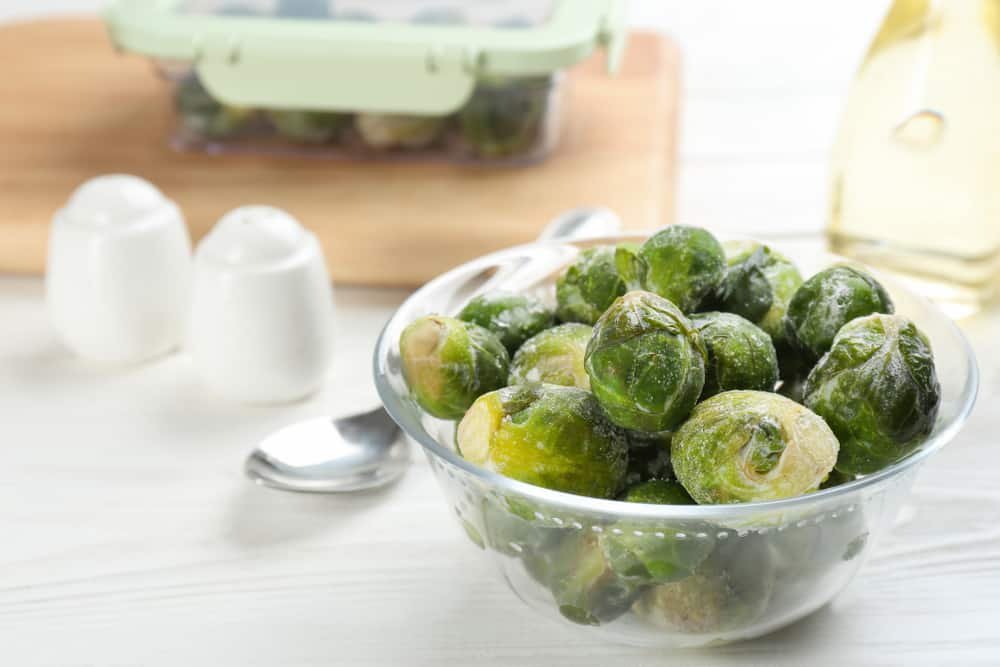
How do you Prepare Frozen Brussels Sprouts after Defrosting?
Once you have thawed your Brussels sprouts, you can prepare them in a variety of ways. One of the most popular methods is to roast them in the oven. Preheat your oven to 400 degrees Fahrenheit and spread the Brussels sprouts out on a baking sheet lined with aluminum foil or a rimmed baking sheet.
You can also boil or microwave your Brussels sprouts after defrosting. Boiling is a quick and easy way to cook them, and microwaving is an excellent option if you are short on time. Just make sure they are cooked all the way through before serving.
When you are roasting frozen brussels sprouts or cooking them in an air fryer, you should add some olive oil or avocado oil. Once it’s ready, add parmesan cheese or garlic powder, black pepper, salt, and some fresh lemon juice, and roast for about 40 minutes, stirring a couple of times during cooking.
How long do Defrosted Brussels Sprouts last?
When you have defrosted brussels sprouts, you should cook them as soon as possible. If you keep them in the refrigerator, they should last between 1 and 2 weeks. If you cook them, they will be fine for about 2 to 3 days in the refrigerator. You can tell when Brussels sprouts are spoiled because they will be soft and mushy to the touch.
They will also display visible signs of mold and smell awful. If you suspect even the slightest bit of spoilage in your sprouts, please do not take a chance. In that case, discard them immediately.
Can you Refreeze Brussels Sprouts once Thawed?
Freezing fresh Brussels Sprouts can help preserve their nutrients and make them last longer. If you’re one of those people who love Brussels sprouts, you may be wondering if you can refreeze them once they’ve been thawed.
The answer is yes, but there are a few things you need to keep in mind. First of all, when freezing any vegetable, it’s important to blanch it first. This helps to preserve the color and texture. When blanching Brussels sprouts, simply boiling them for 3-4 minutes will do the trick. Once they’re blanched, allow them to cool completely before freezing them in a container before you pack them in a freezer-safe bag.
As for thawing and refreezing, the key is to make sure they are cooked before refreezing. Thaw them in the refrigerator overnight, then cook them however you like – roasted or steamed.
FAQs – Thawing Frozen Brussel Sprouts
Can you roast frozen Brussels sprouts?
You can roast frozen Brussels sprouts. Preheat your oven to 400 degrees Fahrenheit and spread the Brussels sprouts out on a baking sheet lined with aluminum foil or a rimmed baking sheet. You can also boil or microwave your Brussels sprouts after defrosting.
Boiling is a quick and easy way to cook them, and microwaving is a great option if you are short on time. Just make sure they are cooked all the way through before serving.
Which oil is best for oven-roasted frozen Brussels sprouts?
When you are roasting frozen Brussels sprouts or cooking them in an air fryer, you should add some olive oil or avocado oil. Once it’s ready, add parmesan cheese or garlic powder, black pepper, salt, and some fresh lemon juice, and roast for about 40 minutes, stirring a couple of times during cooking.
Do frozen Brussels sprouts taste as good as fresh?
There is no right or wrong answer when it comes to whether or not frozen Brussels sprouts taste as good as fresh. Some people say they do, while others maintain that fresh Brussels sprouts are always better.
One thing is for sure: if you cook your frozen Brussels sprouts properly, they will be just as delicious as fresh ones. Ensure you allow enough time for them to roast or air fry, and don’t forget to add your favorite seasonings.
Are frozen vegetables healthy?
Frozen vegetables are healthy. They can be just as nutritious as fresh vegetables, and sometimes even more so. The key is to choose frozen vegetables that are minimally processed and free from added salt, sugar, or other unhealthy ingredients. Additionally, be sure to cook them properly to preserve their nutrients.

